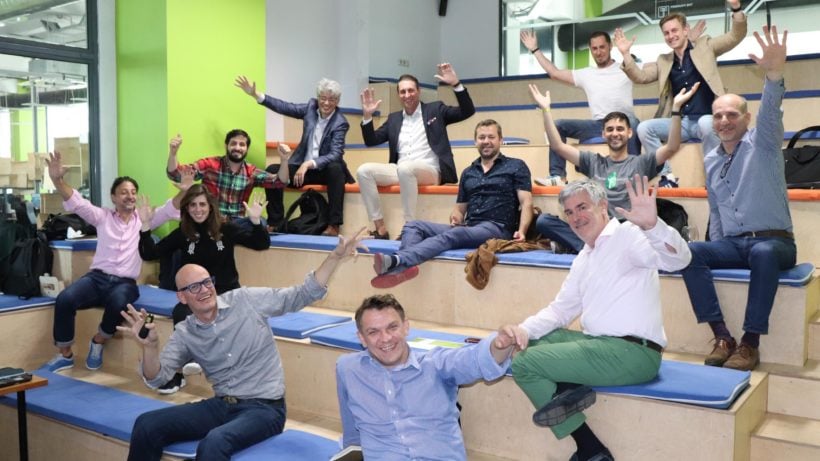For the last couple of months, most businesses have had to take up the digital initiative and switch to doing pretty much everything online. Incubators, accelerators, innovation labs across the world had to quickly adjust to the new situation in order to keep fostering the entrepreneurial spirit and elevating the emerging ecosystem leaders and their startup ideas. How were the regional organizations affected?
Today, The Recursive team is going to meet you with the Bulgarian chapter of Founder Institute – the world’s largest pre-seed accelerator. Launched in Bulgaria in 2015 by Milen Ivanov and Georgi Milenchev, Founder Institute has become one of the most well-known accelerator programs in the country. For the past 6 years, FI has nurtured the ideas of regional entrepreneurs, thus contributing to the development of companies such as Umni.co, Motus Vis, Allcancode, and Roboself. In February 2021, the Bulgarian chapter, partnering with the FI team in Romania, once again opened the application process for the accelerator. This time, all countries from Eastern Europe are eligible to apply and participate in the virtual program. Our connection to the FI team is Janet Todorova, one of the Directors of the accelerator. We discussed the goals, beliefs, and mission of the organization, as well as the upcoming edition of the program that starts on April 27.
Who is who in the Bulgarian team
Globally, the FI program is executed in 200 cities spread across over 90 countries. In 2019, Sofia became the place for FI’s European headquarters. Apart from Todorova, the Bulgarian team has two other Directors – Tatyana Mitkova who is co-founder and CEO at ClaimCompass, and Bozhidar Georgiev – CEO at Work&Share Coworking Space and an alumnus from the first cohort of FI. Elena Nikolova, co-founder, and CMO of Bulgarian startup Escreo is also on board as an Entrepreneur in Residence that helps the startuppers with their pitching strategy and mentors them throughout the program.
The first 2021 edition of FI’s program will be focusing on startups from the Eastern European region, the most large-scale scope so far. The countries covered by the project include Serbia, North Macedonia, Greece, Belarus, Slovenija, Slovakia, the Czech Republic, Albania, Kosovo, Montenegro, Romania, Bulgaria, Moldova, and Ukraine. This has led to the collaboration between the FI Bulgaria and FI Romania teams, with the latter being headed by Alex Dascalu, and also includes Gabriel Paunescu, a serial entrepreneur, who is the Entrepreneur in Residence for FI Romania.
The mechanism behind
In its essence, the program is focused on guiding founders how to start their companies by using a step-by-step approach – starting from the idea stage and going through customer validation, product development, go-to market strategy, and pitching in front of mentors and investors. The curriculum of the program guides the companies on how to improve their business strategies – the FI Directors track each participant’s progress and assign tasks. Todorova shares that one of the main goals of the program is to recreate the real world of entrepreneurship in a safe environment, while also receiving honest feedback from founders, mentors, and investors. The program is designed to meet the needs of people who are still working – there is one session per week, usually in the evening, and throughout the rest of the week, the founders work on company building assignments. The founders from each cohort are split into groups of 5-6 people where they communicate more often and can ask each other for help, feedback, and contacts. In the end, only about 30% of each cohort completes the program.
Time to rebuild
In times of change, entrepreneurs are the ones to get to work building the future. FI would like to support entrepreneurs from all corners of the world to work on things that matter and help shape a better new world. Entrepreneurs can enroll in the 3,5 month-long accelerator program after filling in an application and completing the FI Entrepreneur DNA Assessment. The course fee to enroll is 399 Euro. The business ideas need to be venture scalable and have a tech component, as this is where FI’s expertise is in. Todorova says that another important factor is the personality type of entrepreneurs, as well as their expertise and knowledge in the respective area.
FI tackling the pandemic
The virtual format of the new edition of the program required some curriculum changes to avoid in-person meetings and respect the social distancing measures. In a business environment where virtual discussions are becoming more and more natural, this has helped FI give the founders insights about many new feasible strategies when it comes to online pitching, meetings, and negotiations, Todorova shares. The FI team has also dedicated more efforts to promote the 17 sustainable UN goals among participants.
The virtual format has also helped FI reach a broader audience through a series of online events on key topics such as startup funding in Eastern Europe. Their next online discussion is to happen on March 9 and will feature female entrepreneurs from Eastern Europe, namely Lubomila Jordanova – Co-Founder & CEO at Plan A Earth, Xenia Muntean – Co-Founder & CEO at Planable, and Eli Zhabevska – Senior Associate at South Central Ventures.
Some of the companies that emerged from FI’s program
Bulgaria
Umni – the startup offers an AI-chatbot and data analytics platform for hotels whose achievements include 8 beta hotel customers and training with over 500 hotel topics and 5000 customer questions.
Worddio – its one-in-all edtech app helps people learn foreign words through audio flashcards; according to data from FI, in January 2021, Worddio app was downloaded 40,000 times, a 500% growth MoM.
Croatia
Orioly – the Croatian-based company offers an API booking management platform that integrates directly to travel agencies’ websites and allows the operators to easily list, organize and receive payments for their tours. Recently, Orionly signed a strategic partnership with Touriosity, a commission-free OTA platform that allows providers to receive direct bookings without paying commissions.
Motus Vis – the Croatian startup offers tech accessories whose aim is to improve the security and connectivity of one’s cards and phone without compromising on style. So far, Motus Vis has achieved $890,000 in cumulative sales and had its trademark and wallet product design patents approved by the EU Intellectual Property Office.
Romania
Roboself – its digital assistant optimizes employee efficiency by automating repetitive tasks. While its solution has performed over 50,000 actions for the employees of Roboself’s early customers, the company has managed to attract $200K funding.
Greece
Allcancode – the company specializes in super-fast web and mobile app development for Marketing and Advertising. Its funding amounts to $200K.








